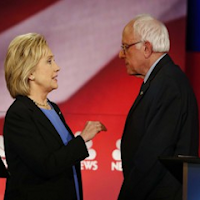 Seven years after Barack Obama earned the majority of Texas' presidential delegates, despite losing the primary vote count to Hillary Rodham Clinton in 2008, the Democratic National Committee put an end to the Texas "two-step" of primary vote and then "caucus" to allocate presidential delegates the Democratic National Convention. The DNC said the Texas two-step "had the potential to confuse voters" for the 2016 primary. Under DNC rules the process must be either all caucus or all polling place votes.
Seven years after Barack Obama earned the majority of Texas' presidential delegates, despite losing the primary vote count to Hillary Rodham Clinton in 2008, the Democratic National Committee put an end to the Texas "two-step" of primary vote and then "caucus" to allocate presidential delegates the Democratic National Convention. The DNC said the Texas two-step "had the potential to confuse voters" for the 2016 primary. Under DNC rules the process must be either all caucus or all polling place votes.The 2016 "Super Tuesday" Texas primary will allocate the largest slate of delegates up for grabs on that election date for Democratic presidential contenders vying for the party’s nomination. With Bernie Sanders increasingly looking like a primary contender against Hillary Clinton, the DNC did not want repeat of the 2008 delegate allocation controversies caused by the two-step process.
Pledged Texas delegates will be allocated to each 2016 Presidential candidate based solely on the number of ballots cast for each candidate in March 1, 2016 Democratic Primary election. Presidential candidates must receive at least 15% of the vote in a Texas Senatorial District to receive a district delegate and must receive at least 15% statewide to receive at-large delegates. Texas is the big post Iowa and New Hampshire prize on Super Tuesday with Texas Democrats selecting 252 delegates, including 30 pledged super delegates, for largest single delegate count of any state up to and including the other super Tuesday states.
The Democratic National Committee long ago adopted a rule specifying presidential delegates must be allocated based solely on the count of primary ballots cast for each candidate. The Texas two-step has been grandfathered by DNC waiver for every presidential election cycle since the DNC adopted that presidential delegate allocation rule.
At its June 26th meeting in Washington, the DNC Rules and Bylaws Committee unanimously rejected the Texas Democratic Party's 2016 primary two-step waiver request. Texas was long the lone remaining state to have continually been granted a waiver to allocate delegates through a two-step primary and precinct convention "caucus" process. Texas Democratic Primary voters WILL NOT return to precinct "caucus" conventions after the polls close on Primary Election Day. Election Day precinct "caucus" conventions are a thing of the past.
